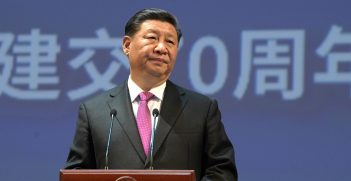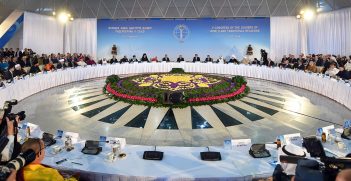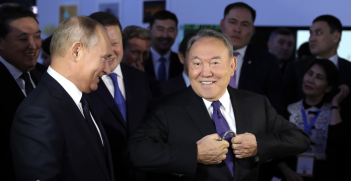Duterte's Foreign Policy Confusion

President Rodrigo Duterte has ushered in a new chapter in Philippine foreign policy: one lacking in continuity, coherence and direction. Previously acrimonious relations with China have drastically improved and creative solutions are now being found to disputes in the South China Sea. At the same time, Duterte’s fiercely critical rhetoric toward the United States has placed the country’s longstanding security alliance in question. These events herald an uncertain time for the Philippines and for Southeast Asia.
Philippine President Rodrigo Duterte is a colourful character. The usually sombre structure of global diplomacy with its tradition, protocol and etiquette as primordial values, have contrasted with the raw honesty, populist theatrics, impulsiveness and frivolity of President Duterte. It has not been received with delightful enthusiasm. The succession of diplomatic faux pas that have marked Duterte’s term makes it obvious that he is foreign policy novice.
Whilst his bombastic style and rough language have concerned the international public, it is his unrelenting war on drugs, the swelling number of extrajudicial killings and his foreign policy adventures that have caused lingering concern at home. However, the president continues to enjoy massive levels of popular support, he has absolute majority control over both houses of Congress and is without a credible opposition. Duterte is therefore the current master of Philippine politics.
Rudderless foreign policy
The Philippine foreign policy conundrum can be summed up in one word: Duterte. The constitutional structure is essentially presidential in orientation, vesting overwhelming power and authority in the chief executive. Therefore, Duterte is the chief architect of Philippine foreign policy. This places a heavy burden on his shoulders–to have a solid grasp of geopolitics, foreign relations and international law. He has yet to demonstrate mastery of any.
It is clear that Philippine foreign policy under President Duterte will be profoundly different from the one pursued by the previous administration of President Benigno Aquino III. The priorities, philosophy and dynamics that inform the policies of Duterte will be fashioned and influenced by his background as a local politician from the southern Philippines. Moreover, they will be predicated on his anti-establishment position as a virtual outsider in national politics and a neophyte in foreign affairs.
Duterte’s conciliatory and amicable stance towards China seems to contradict his usual intrepid, volatile and pugnacious temperament. The president’s colourful language towards the US, reveals a deep-seated resentment towards the country, and is a thin veneer covering a hollow foreign policy on a dangerously isolationist path. While Duterte has demonstrated a talent for embarrassing histrionics, he has yet to unveil a carefully crafted and detailed policy towards China and how his administration intends to deal with the complex disputes in the South China Sea.
In crafting Duterte’s foreign policy blueprint, he needs to consider the three interconnected pillars upon which Philippine foreign policy rests: national security, economic security and the protection of the rights and interests of Filipinos overseas. His more amicable and less confrontational position in respect to the South China Sea, contrasts with his brazen contempt of the US, representing a radical shift in longstanding foreign policy alignments. This departure requires a delicate balancing act and will be met with strong opposition and may encourage instability in the region, and especially within ASEAN.
A victory forgotten
It was just five months ago, on 12 July 2016, that the final award of the Arbitral Tribunal ruled on the case filed by the Philippines against China over the South China Sea. It was an overwhelming legal and moral victory for the Philippines. In sharp contrast to the Aquino administration’s more bellicose stance towards Beijing, President Duterte has adopted a “no-taunt, no-flaunt” policy to cushion the blow of the ruling against China. China’s optimism in the Duterte administration indicates that the conciliatory approach of the new administration has not gone unnoticed in Beijing. President Duterte has since avoided extended discussion of the legal victory, and has yet to reveal a well thought-out strategy that the country can employ towards Beijing. The hard-fought victory has been shamefully reduced, in the very words of Duterte, to a mere “piece of paper”, which the current administration has decided to disregard in bilateral negotiations with China.
It appears that the arbitral award is not the only historical fact that Duterte conveniently wishes to forget. In October, during Duterte’s state visit to China—in a baffling display of historical revisionism—he stated that China “has never invaded a piece of my country all these generations”. He must have overlooked the incontrovertible fact that in 1995, China seized Mischief Reef, which was affirmed in the arbitral award as legally part of the Philippines’ continental shelf. Furthermore, that China in 2012 has physically occupied Scarborough Shoal, also defined under Philippine law as part of the national territory. The Philippines should be apprehensive that Duterte sought China’s permission for Filipinos to resume fishing operations in Scarborough Shoal, as there are possible injurious legal implications of this act on the Philippine claim.
In the same state visit, Duterte also announced the country’s military and economic “separation” from the United States, which was immediately clarified as not severance of diplomatic ties but merely a foreign policy more independent of the US. Curiously, Duterte’s idea of foreign policy includes an alliance with China and Russia since the country has reached a “point of no return” in its relations with the US, its former colonial ruler. These moves reinforce his administration’s accommodating posture towards China and possibly foreshadowing an impending security realignment.
A new chapter in Philippine-China relations
The direction of Philippine-China relations under Duterte is still uncertain. The paucity of any solid, long-term and categorical statement from Duterte on the South China Sea—indeed on foreign policy in general—makes crystal ball gazing particularly difficult. At best, Duterte’s rhetoric suggests more cordial relations between Manila and Beijing. The softening of Manila’s stand against an increasingly aggressive and expansionist China could expose cracks in the existing regional security architecture. It could also further weaken the concerted efforts of extra-regional powers, such as the US and Japan, to counterbalance China’s provocative military posturing, as well as subverting ASEAN initiatives to present a unified position against an assertive China. Duterte’s reckless statements that the Philippines will discontinue its alliance with the US in favour of an alliance with China and even Russia—if acted upon—will radically reorder the security situation not just in the South China Sea, but the entire Asia-Pacific region. A rapid shift in defence posture by Manila could further increase the risk of miscalculations and provocations on the ground, and undermine longstanding efforts to reinforce a rules-based approach to resolving the South China Sea dispute.
Dr Lowell Bautista is a senior lecturer at the School of Law and a staff member at the Australian National Centre for Ocean Resources and Security, Faculty of law, Humanities and the Arts at the University of Wollongong.
This article is published under a Creative Commons Licence and may be republished with attribution.





